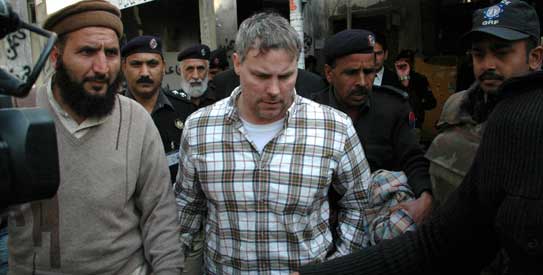
ISLAMABAD: The unrelenting confusion over whether or not US citizen Raymond Davis enjoys diplomatic immunity has, expectedly, bogged down his trial on charges of double murder in Lahore.
The adjournment by the Lahore trial court on Friday has caused legal experts, especially those connected to Davis, to predict that the case cannot proceed further till the immunity dispute is settled one way or the other.“The US embassy is pleased that the court has realised the importance of diplomatic immunity,” US embassy spokesperson Courtney Beale told Dawn. However, this realisation may not easily lead to the resolution of the dispute which is quite complex.
Indeed, the question of Davis's immunity has been made complicated by serious blunders committed by the Foreign Office, the US embassy and the Punjab government.
The story started with his Jan 20, 2010, notification of posting in Pakistan.
US legal experts insist that the January 2010 notification is the 'controlling document' and provides the basis for his immunity. “The sending state (US in this case) is free to appoint anyone until the host government (Pakistan) definitely tells the mission that the person is not acceptable,” an international law expert said.
However, even after a year of his notification the Foreign Office did not decide whether or not to accept him -- despite the fact that Davis was in the country and working.
In fact, Davis had been in Pakistan since October 2009, months before the notification of his posting in the embassy.
So that is the first mistake of the FO which took too long to decide one way or the other. Even though many officers of the foreign ministry are now trying to put the blame on the US by pointing out that later at the registration stage (which is required under Pakistan's laws and not the international law) the FO sought more information, particularly related to the 'procedural inconsistencies in his appointment', to which the American embassy provided no answers.
To put it straight, even though no one is willing to admit it, the state was hesitant to say yes or no in Davis's case because he was a CIA agent. The request for his registration (which came after the notification) filed with the FO clearly said that he would be assigned to the Regional Affairs Office, which is indisputably linked to the CIA.
It is important to note that questioning Davis's immunity on the grounds that he wasn't registered in Pakistan as a diplomat doesn't appear valid in the light of the Vienna conventions, which only require a notification from the sending state.
The story of the blunders does not begin or end with the FO.
A serious mistake by the US embassy was that it notified the FO on the date of the incident in Lahore (Jan 27, 2011) that the individual involved in the shooting was assigned to the American consulate in Lahore.
This was a mistake as under the Vienna conventions, consular employees do not enjoy blanket immunity which is limited to embassy officials. By the time the Americans realised this, it was too late. Their own notification had punched holes into their case.
Had they not issued the Jan 27 notification, the only document in existence would have been the earlier Jan 20, 2010, notification, which would enable Davis to enjoy blanket immunity. Since then the Americans have realised their mistake and they have been parroting one line: 'The Jan 20, 2010, notification is the controlling document.'
They are not willing to talk about the Jan 27, 2011, diplomatic note.
In private discussions some US officials now claim that Davis was on temporary attachment with the US consulate in Lahore, which is a standard practice with missions all over the world. But the Jan 27, 2011, note does not say anything of that sort.
Interestingly, no one has been focusing on the mishandling of Davis's arrest by the Punjab police. The country could have been probably spared the controversy that has been dogging it for almost a month had proper procedures been followed in his arrest, a top government functionary claimed.













































Dear visitor, the comments section is undergoing an overhaul and will return soon.